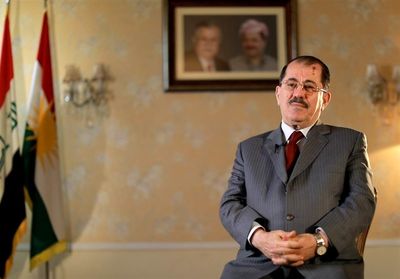Nazim Omar Dabbagh was born in September 1947 in the city of Kuyeh (Erbil province). After the liberation of Iraqi Kurdistan, he became the representative of the Patriotic Union of Kurdistan in Duhok province in the same year. Dabbagh first represented the Patriotic Union of Kurdistan in economic and trade affairs in Iran, and in 2002 became the representative of the Patriotic Union of Kurdistan in Iran. Since 2007, in addition to representing the Patriotic Union, he has been responsible for representing the Iraqi Kurdish region in Iran.
Here is Honaronline’s exclusive interview with Nazim Dabbagh.
What role can Nowruz play as an important cultural factor in the region's public diplomacy?
As a Kurdish speaker, I must say that Nowruz is the victory of freedom over oppression. In terms of nature, Nowruz is the beginning of a new season for the growth and revival of nature. This makes people happy. People these days were thinking of happiness and well-being so that they could live a peaceful life.
Can Nowruz be a connecting factor in the Middle East, Caucasus and Eurasia?
Different ethnic groups and regions in the Middle East, such as Iran, Afghanistan, Tajikistan and other countries, celebrate Nowruz. During the presidency of Dr. Mahmoud Ahmadinejad in Iran, a ceremony was held in which all the countries that had Nowruz gathered together in the framework of a celebration and celebrated that day. This shows that Nowruz can be turned into a political and diplomatic issue so that countries can establish security and comfort among themselves. Maybe one day it will renew that previous honesty. Gathering people in one area and celebrating a ritual like Nowruz can encourage leaders to reconcile governments.
What are the most important traditions and customs of Nowruz in your fatherland?
Nowruz originates from Iranian culture. We Kurds also celebrate Nowruz. Before the day of Eid, people prepare new and traditional Kurdish clothes and wear them on the same day when they go out. They prepare all kinds of traditional foods that can be prepared and congratulate each other on Nowruz. They call each other and say we want to gather somewhere and you come too. Friends and acquaintances are always thinking of coming together on this day to celebrate Nowrouz. In some parts of Kurdistan in Iran, we have the Haft-Sin table, but in Iraqi Kurdistan there is no such thing. In the old days, after sunset, people, especially young people, would go to the top of a mountain or hill and build a fire in memory of the fire that Kaveh (mythic character in Iran) had lit. There are also ceremonies and games in memory of Zahak (mythic devil in Iran) and Kaveh.
Given the cultural exchanges between Iran and Iraqi Kurdistan in recent years, is it possible to expand cultural and artistic potential, especially in the field of Nowruz between the two countries?
There is currently no special program, but it is possible to plan. But in the past, sometimes cultural and artistic groups held different works in the two countries. Even in the region of Marivan, Sanandaj and Mahabad, like us, they went to the desert and plains on Nowruz, but considering the current situation, I do not know what will happen this year.
Last year, Nowruz was not held in the Kurdistan region due to corona restrictions. Will this ceremony be held this year?
We have not yet decided to hold the ceremony. With the outbreak of the new corona, a number of restrictions have been imposed and we do not know whether these restrictions will continue in the city or not. Last year, Nowruz was celebrated in the cities to some extent, and people gathered in open spaces. I think the routine of Nowruz will be held in this way this year as well. Currently, traffic between Iran and the Kurdish region is prohibited, and only Kurds who want to return to Iraqi Kurdistan from Iran or vice versa are allowed to move.
By Dorsa Bakhshandegi

